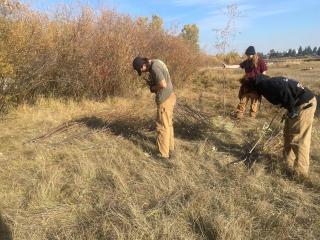Trapper Creek CCC, partners make a difference for trout and migratory birds
MONTANA – Trapper Creek Job Corps Civilian Conservation Center recently partnered with the U.S. Fish and Wildlife Service and Trout Unlimited to both restore fish access and improve habitat refuge for migratory birds. Part of the work consisted of removing an old culvert and bridge system that blocked fish from the Bitterroot River into Burnt Fork Creek.
Trout Unlimited reached out to Trapper Creek Job Corps to see if they would participate in the community restoration project. Scott Aronson, forestry conservation and firefighting instructor for Trapper Creek Job Corps CCC, learned about the project and decided it was a great opportunity.
“We worked with Trout Unlimited to take willow cuttings from Skalkaho Bend Park in Hamilton that would be used in a larger restoration project at Lee Metcalf Wildlife Refuge,” said Aronson.
The joint effort between agencies and nonprofit organizations allows the Forest Service to leverage a more intentional approach to collaborative land management. Tapping into partnerships not only allows for the mutual expertise of a collective bandwidth, pooling these resources provides Job Corps students to gain beneficial expertise and knowledge in their respective trades and see land management practices on a larger scale.
“I think it’s always good for students to get off center and participate in work in the field,” said Aronson. “At Trapper, we have a really well-developed fire program and we do lots of work at campgrounds and on trails, but we hadn’t really had a chance to do any restoration work like this.”
Civilian Conservation Centers stand out within the Job Corps program. These centers offer occupational and technical training like welding and carpentry, but students can explore in-demand careers like forestry, wildland firefighting, dispatch, and other various occupations related to conservation and natural resource management. Due to the rural location of these centers, CCCs partner with their local communities to revitalize or restore vital infrastructure, improve conservation efforts, and mobilize to disaster response when needed. Through enhanced partnerships and the conservation-focused mission of CCCs, centers provide a valuable economic stimulus to their surrounding local communities, but also develop essential student skills that become active future participants in preserving and protecting our environment.
“I think a lot of groups came together to make this work, and we were just a small part of that,” said Aronson. “It’s a pretty cool example of collaboration between nonprofits, various government entities, and the local community to improve a place that the community uses.”
National forests are the perfect place to enhance skills for in-demand career fields. Graduates of the Job Corps program provide a skilled workforce due to their diverse backgrounds and skillsets. Many graduates tend to move directly to the workforce, enter the military, college or other advanced training programs.
Mason Quest, a forestry conservation and firefighting trade student, Trapper Creek Job Corps CCC, saw the value of how hands-on work is practical for other avenues of life.
“What brought me to Trapper Creek was the fact that I had no structure in life,” said Quest. “I was being a delinquent and on a wrong path.”
Students come to Job Corps for a variety of reasons. Civilian Conservation Centers want to provide students the opportunity to change their lives and prepare them to enter the American workforce. Involvement in community projects demonstrates the student’s willingness to work alongside trusted professionals and helps them build valuable connections that may assist them in their careers.
When students conduct work in the local community, they also learn valuable skills about the surrounding natural environment that is unique to the Forest Service Job Corps program. These diverse skills are necessary for addressing ongoing conservation challenges in today’s everchanging environment to make informed decisions for the future.
Forest Service Job Corps operates 24 Civilian Conservation Centers in 15 states across the country. Students like Quest can learn about the larger Forest Service mission and explore prospective careers where they can build a career they enjoy.


